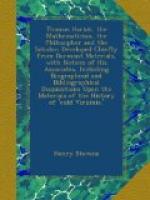Though unsuccessful himself, Raleigh lifted his country into success more than any other one man of his time. To this day he is honoured alike in the old country that gave him birth, and in the new country to which he gave new life. His energy, enterprise, and fame are now a part of England’s history and pride, while his disgrace and death belong to his king. Thomas Hariot was for nearly forty years his confidential lieutenant throughout his varied career.
From his youth Raleigh had sympathized, like many intelligent Englishmen, with the Huguenot cause in France. As early as 1569, at the age of seventeen, he had been one of a hundred volunteers whom Elizabeth sent over to assist and countenance Coligni. He thus probably became better acquainted with the great but unsuccessful scheme of colonizing Florida. At all events the history of that disastrous French Huguenot colonization was first published under his auspices, and a chief survivor, Jacques Le Moyne, became attached to his service and interests. The story is in brief as follows.
Gaspar de Coligni, Admiral of France, often in our day called the French Raleigh, was a Protestant, and firm friend of England. One of his captains, Jean Ribault, of Dieppe, also a Protestant, had written an important paper on the policy of preserving peace with Protestant England. That paper, transmitted by the Admiral to England, is still preserved in the national archives. Ribault became the leader of Coligni’s preliminary expedition in 1562 into Florida to seek out a suitable place, somewhere between 30° north latitude and Cape Breton, for the discomfited Huguenots to retire to and found a Protestant colony. The previous Brazilian project had already been abandoned as impracticable and unsuccessful.
Hitherto the Spanish Roman Catholic maritime doctrine had been that to see or sail by any undiscovered country gave possession. But the French Protestants, now firmly rejecting the Pope’s gift, required occupation in addition to discovery to secure title. Hence Florida at that time, not being occupied by the Spanish, was considered open to the French. Ribault sailed from Havre the 18th of February 1562, taking a course across the Atlantic direct, and, as he thought, new, making his land fall on the 30th of April at 29½ degrees; but Verrazano had in 1524 sailed also direct for Florida, taking a similar course, with the difference that he started from Madeira. Thence coasting northward, seeking for a harbour, touching at the river of May, and proceeding up the coast to 32½ degrees, Ribault found a good harbour into which he entered on the 27th of May, and named it Port Royal. He was so well pleased with the country that, perhaps contrary to instructions, he left a colony of thirty volunteers, under Capt. Albert de la Pierria, and returned home with the news, arriving in France, after a quick voyage, on the 20th of July, 1562.




